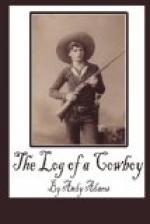After following the Tongue River several days and coming out on that immense plain tributary to the Yellowstone, the trail turned to the northwest, gave us a short day’s drive to the Rosebud River, and after following it a few miles, bore off again on the same quarter. In our rear hung the mountains with their sentinel peaks, while in our front stretched the valley tributary to the Yellowstone, in extent, itself, an inland empire. The month was August, and, with the exception of cool nights, no complaint could be made, for that rarefied atmosphere was a tonic to man and beast, and there was pleasure in the primitive freshness of the country which rolled away on every hand. On leaving the Rosebud, two days’ travel brought us to the east fork of Sweet Grass, an insignificant stream, with a swift current and rocky crossings. In the first two hours after reaching it, we must have crossed it half a dozen times, following the grassy bottoms, which shifted from one bank to the other. When we were full forty miles distant from Frenchman’s Ford on the Yellowstone, the wagon, in crossing Sweet Grass, went down a sidling bank into the bottom of the creek, the left hind wheel collided with a boulder in the water, dishing it, and every spoke in the wheel snapped off at the shoulder in the felloe. McCann never noticed it, but poured the whip into the mules, and when he pulled out on the opposite bank left the felloe of his wheel in the creek behind. The herd was in the lead at the time, and when Honeyman overtook us and reported the accident, we threw the herd off to graze, and over half the outfit returned to the wagon.
When we reached the scene, McCann had recovered the felloe, but every spoke in the hub was hopelessly ruined. Flood took in the situation at a glance. He ordered the wagon unloaded and the reach lengthened, took the axe, and, with The Rebel, went back about a mile to a thicket of lodge poles which we had passed higher up the creek. While the rest of us unloaded the wagon, McCann, who was swearing by both note and rhyme, unearthed his saddle from amongst the other plunder and cinched it on his nigh wheeler. We had the wagon unloaded and had reloaded some of the heaviest of the plunder in the front end of the wagon box, by the time our foreman and Priest returned, dragging from their pommels a thirty-foot pole as perfect as the mast of a yacht. We knocked off all the spokes not already broken at the hub of the ruined wheel, and after jacking up the hind axle, attached the “crutch.” By cutting a half notch in the larger end of the pole, so that it fitted over the front axle, lashing it there securely, and allowing the other end to trail behind on the ground, we devised a support on which the hub of the broken wheel rested, almost at its normal height. There was sufficient spring to the pole to obviate any jolt or jar, while the rearrangement we had effected in distributing the load would relieve it of any serious burden. We took a rope from the coupling pole of the wagon and loosely noosed it over the crutch, which allowed leeway in turning, but prevented the hub from slipping off the support on a short turn to the left. Then we lashed the tire and felloe to the front end of the wagon, and with the loss of but a couple of hours our commissary was again on the move.




